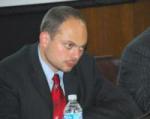
By Vladimir Kara-Murza
On Thursday, the Russian parliament overwhelmingly passed a bill that authorizes administrative arrest for expressing “patent disrespect” for the government. The author, Senator Andrei Klishas, knows something about “disrespect”: He was recently the subject of a wide-ranging investigation by anti-corruption activist Alexei Navalny detailing his properties in Switzerland and his $2.5 million watch collection. Vladimir Zhirinovsky, head of the ultranationalist LDPR party and a faithful Kremlin ally, said that the new law provides “protection for our country” — as always, making a false equivalence between Russia and its kleptocratic regime.
One would have to go back to Soviet times to find a law prosecuting anti-government speech in Russia. Article 70 of the RSFSR Criminal Code carried a penalty for “anti-Soviet agitation.” It was under this provision that the most prominent dissidents, including Sergei Kovalev and Vladimir Bukovsky, were sentenced to lengthy prison terms. That clause was abolished in 1989, only to be replaced by a new law in 1990 that provided for imprisonment for “publicly insulting” the president. The fall of the Soviet regime in 1991 decriminalized free speech. Whatever his other failings, President Boris Yeltsin viewed media freedom as sacrosanct, even when “public insults” of himself filled Russia’s airwaves.
Vladimir Putin’s rise to power spelled the end of pluralism on nationwide television, but the government takeover of private TV networks between 2001 and 2003 was clumsily disguised as “shareholder disputes.” The arrests of major political opponents were also carried out under false pretenses. Vladimir Gusinsky, the owner of Russia’s largest independent media group, was arrested for “misappropriation of funds.” Mikhail Khodorkovsky, an oil tycoon who irked the Kremlin with his support for civil society and opposition parties, spent more than a decade in prison for “tax evasion.” And a “fraud” charge was used to give Navalny a suspended prison sentence that disqualified him from running against Putin in the 2018 election. (Disclosure: I currently serve as vice chairman of the Open Russia movement founded by Khodorkovsky.)
The first law in modern Russia that criminalized opposition activism as such was signed by Putin in May 2015, but its magnitude was not immediately apparent. That measure gave the government powers to designate foreign and international NGOs as “undesirable organizations.” Any Russian citizen found to be working with them could be criminally liable to up to six years in prison. The list of “undesirables” was quickly filled with some of the world’s most reputable pro-democracy organizations, such as the National Endowment for Democracy and the European Platform for Democratic Elections, which ceased operations inside Russia and evacuated remaining staff members.
In what marked a new level of lawlessness even by Kremlin standards, the law that is supposed to target “foreign undesirable organizations” is now being used against Russian opposition groups. This week, Anastasia Shevchenko, an activist of the Open Russia movement in the southern city of Rostov-on-Don, became the first person to be arrested and criminally charged for “participating in the activities of a foreign undesirable organization.” Open Russia, founded by Khodorkovsky and chaired by Andrei Pivovarov, a prominent opposition activist from St. Petersburg, is a Russian pro-democracy movement run by Russian citizens and operating on Russian territory. This did not stop the Kremlin from designating it a “foreign undesirable organization” and going after its members. According to the latest count, 53 activists have been charged with administrative offenses under the “undesirables” law. Two or more administrative offenses could lead to a criminal indictment.
On Wednesday, after two days in pretrial detention, Shevchenko appeared in a Rostov courtroom to be sentenced to two months of house arrest, pending a trial. Her two young children will stay with her; her oldest daughter, a special needs child, lives at a care facility, which she will now be unable to visit. Shevchenko is forbidden from going to work or using the Internet. Requesting house arrest, investigators noted that Shevchenko’s activities could “undermine constitutional order and the country’s defense capabilities.” This presumably refers to educational seminars and election training organized by Open Russia.
“It is a worrying precedent and could open the floodgates to the prosecution of hundreds of Open Russia members across the country,” Amnesty International said in a statement. “Anastasia Shevchenko is a prisoner of conscience. She must be immediately and unconditionally released.”
“This is a police state in pure form,” noted Lev Shlosberg, a regional lawmaker in Pskov from the opposition Yabloko party, adding that millions of people in Russia are “undesirable” in the Kremlin’s eyes.
As this week’s events in Venezuela reminded, the tables can turn quickly — and it is citizens who may one day tell their unelected rulers that it is, in fact, they who are undesirable.
https://www.washingtonpost.com...
























